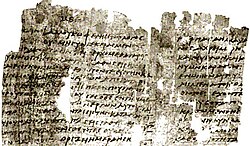|
Hebrews 10
Hebrews 10 is the tenth chapter of the Epistle to the Hebrews in the New Testament of the Christian Bible. The author is anonymous, although the internal reference to "our brother Timothy" (Hebrews 13:23) causes a traditional attribution to Paul, but this attribution has been disputed since the second century and there is no decisive evidence for the authorship.[1][2] This chapter contains the exposition about Christ's effective sacrifice and the exhortation to continue in faithfulness and expectancy.[3][4] TextThe original text was written in Koine Greek. This chapter is divided into 39 verses. Textual witnessesSome early manuscripts containing the text of this chapter are:
Old Testament references
 New Testament referencesThe True Sacrifice (10:1–10)Attridge sees the final stage of Jeremiah 31 exposition to indicate that "Christ inaugurated the new and interior covenant by an act of conformity to God's will".[9] Verse 4
This is one of the four things to be 'impossible' according to this epistle (Hebrews 6:4; 6:18; 10:4; 11:6).[11] Verse 5
Verse 10
It is the will of God that the believers be sanctified (cf. 1 Thessalonians 4:3) and Christ's act of obedience made God's will his own, because Christ's death conformed to God's will (Galatians 1:4; Ephesians 1:5–11; 1 Peter 3:17) and Christ's obedience—attested in the Gethsemane story (Matthew 26:42; Luke 22:42) and the fourth gospel (John 4:34; 5:30; 6:38–40; 19:30—is decisive for establishing the new covenant.[14] It is the first time in the epistle that the composite name 'Jesus Christ' appears (cf. Hebrews 13:8).[14] Summation (10:11–18)This section weaves together the themes of the previous few chapters.[14] Verse 14
Hold Fast to Faith (10:19–24)This part contains an exhortation to live as members of the "new covenant" which stresses faith (verse 22), hope (verse 23) and love (verse 24), a traditional triad also seen in 1 Corinthians 13:13.[14] Warning and Encouragement (10:24–39) Verses 26-31 reference the unforgivable sin according to theologians, such as John Wesley.[17] The encouragement in verse 32-29 balances the threat or warning in verses 24-31.[14] Verse 37
This verse combines the quote 'a little while' from Isaiah 26:20 with the quote 'will not tarry' from Habakkuk 2:3 in its Greek form, rendering it as a prediction of one 'who is coming' that points to the imminence of Christ's second coming.[14][19]
Verse 38
Cited from the LXX version of Habakkuk 2:4 which reads:
Here "he shrinks back" is not applied to the "coming one" but to "those who await God's deliverance."[19] Paul also cites Habakkuk 2:4 in Galatians 3:11 and Romans 1:17 to contrast "faith" and "works of the law".[22] Verse 39
This verse contrasts the result of two opposite lines of action: εἰς ἀπώλειαν, eis apōleian ("to perdition/destruction") or εἰς περιποίησιν ψυχῆς, eis peripoiēsin psychēs, ("to the gaining of the soul"; cf. 1 Thessalonians 5:9: εἰς περιποίησιν σωτηρίας, eis peripoiēsin sōtērias, "to obtain salvation").[26] See also
References
Bibliography
External links
|
||||||||||||||
